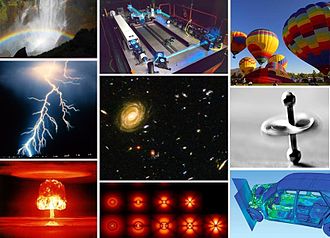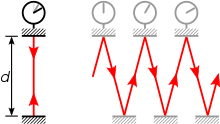Physics
![]()
This article describes the natural science of physics. For the work of Aristotle, see Physics (Aristotle). For the music album, see Physics (album).
Physics is a natural science that studies fundamental phenomena of nature. In order to explain their properties and behaviour on the basis of quantitative models and laws, it deals in particular with matter and energy and their interactions in space and time.
To explain here means to classify, to compare, to assign to more general phenomena or to deduce from more generally valid laws of nature. This often requires the formation of new, suitable concepts, some of which are no longer accessible to direct observation. Physics cannot provide explanations in the philosophical sense of "why" nature behaves as it does. Instead, it deals with the "how". For example, it cannot explain why masses attract each other. This behavior can only be described by various models. Newton did this by assuming that there is an attractive force between bodies. Einstein had a completely different idea, explaining gravity by the fact that matter curves space-time.
The way physics works consists of a combination of experimental methods and theoretical modelling. Physical theories prove themselves in their application to systems of nature, in that they allow predictions to be made about later states, given knowledge of their initial states. Advances in knowledge result from the interaction of observation or experiment with theory. A new or further developed theory can explain known results better or for the first time at all and, in addition, stimulate new experiments and observations whose results then confirm or contradict the theory. Unexpected observational or experimental results give rise to theory development in various guises, from gradual improvement to the complete abandonment of a long-accepted theory.
Findings and models of physics are used intensively in chemistry, geology, biology, medicine and engineering.

Various examples of physical phenomena
History of the concept and discipline of physics
→ Main article: History of physics
The discipline of physics in its present form has its origins in philosophy, which since antiquity has been concerned in the broadest sense with the reasons and causes of all things. From Aristotle until the beginning of the 19th century, physics was understood as the branch of philosophy that deals with the facts of nature as natural theory, natural history, chemistry or applied mathematics. In contrast to the purely philosophical attempts to explain natural processes, the kind of knowledge that can be gained through systematic and precise observation, i.e. empirically, played no role for a long time. Then, from the middle of the 13th century and in the course of the 14th century, individual philosophers and naturalists - usually one and the same person, such as Roger Bacon - pleaded for greater weight to be given to the knowledge of nature to be gained through observation. These tendencies culminated in the 16th and 17th centuries, notably with Galileo Galilei and Isaac Newton, in the development of a methodology of physical knowledge oriented primarily to empirical and even experimental standards, and even giving these precedence over traditional philosophical principles in cases of doubt. This approach was initially called "experimental philosophy" and quickly led to significant successes in understanding many different natural processes. Nevertheless, it took until the 19th century for it to finally gain acceptance in physics and thus establish it as an independent discipline in its current sense.
With regard to its method, its subject area, its scientific system and its institutional location, physics is essentially divided into two large areas. Theoretical physics deals primarily with formal mathematical descriptions and the laws of nature. It abstracts processes and phenomena in real nature in the form of a system of models, generally valid theories and laws of nature as well as intuitively chosen hypotheses. In the formulation of theories and laws, it often uses the methods of mathematics and logic. The aim is to predict the behaviour of a system theoretically so that this can be verified by comparison with the processes and phenomena in real nature. This verification in the form of reproducible measurements on specifically designed physical experiments or by observation of natural phenomena is the field of experimental physics. The result of the verification determines the validity and predictive power of the model and the concepts, hypotheses and methods chosen in it.
Physics is closely related to engineering and the other natural sciences, from astronomy and chemistry to biology and the earth sciences. Physics is often regarded as the basic or fundamental natural science, which is most concerned with the fundamental principles that govern natural processes. The demarcation between physics and the other natural sciences has arisen historically, but is becoming increasingly difficult, especially with the emergence of new scientific disciplines.
In today's physics, the boundary to chemistry, marked by atomic and molecular physics and quantum chemistry, is particularly fluid. To distinguish it from biology, physics has often been called the science of inanimate nature as opposed to animate nature, but this implies a limitation that does not exist in physics. Engineering is distinguished from physics by its close relation to practical engineering applications, since physics focuses on understanding fundamental mechanisms. Astronomy has no possibility of conducting laboratory experiments and is therefore solely dependent on observation of nature, which is used here to differentiate it from physics.
Methodology
The acquisition of knowledge in physics is closely intertwined with experiment and theory, i.e. it consists of empirical data acquisition and evaluation and, at the same time, the creation of theoretical models to explain them. Nevertheless, in the course of the 20th century, specializations have emerged that characterize professional physics today. Accordingly, experimental physics and theoretical physics can be roughly distinguished from each other.
Experimental Physics
→ Main article: Experimental physics
While some natural sciences, such as astronomy and meteorology, have to limit themselves methodically to observations of their object of investigation, in physics the experiment is in the foreground. Experimental physics attempts to detect regularities by designing, setting up, conducting and evaluating experiments and to describe them by means of empirical models. On the one hand, it tries to enter new physical territory, on the other hand, it verifies predictions made by theoretical physics.
The basis of a physics experiment is to express the properties of a previously prepared physical system, for example a thrown stone, an enclosed gas volume or a particle in an impact process, in numerical form by measurement, for example as impact velocity, as resulting pressure (given boundary conditions) or as the length of the observable particle tracks in the detector.
In concrete terms, either only the time-independent (static) properties of an object are measured or the temporal development (dynamics) of the system is investigated, for example by determining the initial and final values of a measurand before and after the course of a process or by determining continuous intermediate values.
Theoretical physics
Theoretical physics seeks to mathematically relate the empirical models of experimental physics to known basic theories or, if this is not possible, to develop hypotheses for a new theory that can then be tested experimentally. Furthermore, it derives empirically testable predictions from already known theories.
In developing a model, reality is basically idealized; one initially focuses only on a simplified picture in order to survey and explore its aspects. After the model has matured for these conditions, it is further generalized.
For the theoretical description of a physical system, the language of mathematics is used. Its components are represented by mathematical objects such as scalars or vectors, which are related to each other by equations. Unknown quantities are calculated from known quantities and thus, for example, the result of an experimental measurement is predicted. This view focused on quantities distinguishes physics significantly from philosophy and has the consequence that non-quantifiable models, such as consciousness, are not considered part of physics.
The fundamental measure of the success of a scientific theory is its agreement with observations and experiments. By comparison with experiment, the range of validity and the accuracy of a theory can be determined; however, it can never be "proven". To disprove a theory or to show the limits of its range of validity, a single experiment is in principle sufficient, provided it proves reproducible.
Experimental physics and theoretical physics are thus constantly interrelated. However, it can happen that results from one discipline precede the other: For example, many predictions of string theory are currently not experimentally testable; on the other hand, many values from the field of particle physics, some of which have been measured very precisely, cannot be calculated at the present time (2009) by the associated theory, quantum chromodynamics.
Other aspects
In addition to this basic division of physics, one sometimes distinguishes other methodological subdisciplines, especially mathematicalphysics and applied physics. Work with computer simulations also has features of its own area of physics.
Mathematical Physics
→ Main article: Mathematical physics
Mathematical physics is sometimes considered a subfield of theoretical physics, but differs from it in that its object of study is not concrete physical phenomena, but the results of theoretical physics itself. It thus abstracts from any application and is interested instead in the mathematical properties of a model, in particular its deeper symmetries. In this way, it develops generalizations and new mathematical formulations of already known theories, which in turn can be used as working material by theoretical physicists in the modeling of empirical processes.
Applied Physics
→ Main article: Applied physics
Applied physics is (vaguely) distinguished from experimental physics, and partly also from theoretical physics. Its essential characteristic is that it does not investigate a given physical phenomenon for its own sake, but in order to use the knowledge gained from the investigation to solve a (usually) non-physical problem. Its applications are in the field of engineering, but also, for example, in economics, where methods of theoretical solid state physics are used in risk management. There are also the interdisciplinary fields of medical physics, physical chemistry, astrophysics and biophysics.
Simulation and computational physics
→ Main article: Computational physics
With the progressive development of computational systems, computer simulation has emerged as a new methodology within physics in the last decades of the 20th century, accelerating since about 1990. Computer simulations are often used as a link between theory and experiment to gain predictions from a theory, on the other hand simulations can also give an impetus back to theoretical physics in the form of an effective theory that re-models an experimental result. Naturally, this area of physics has numerous points of connection to computer science.

The light clock, a well-known thought experiment

Multimeter for electrical measurements
Questions and Answers
Q: What is Physics?
A: Physics is a branch of science that studies matter, forces and their effects. It seeks to explain how things move in space and time and understand how the universe behaves.
Q: Where does the word "physics" come from?
A: The word physics comes from the Greek word ἡ φύσις, meaning "nature".
Q: How is physics important for technology?
A: Physics plays an important role in the development of new technologies such as airplanes, televisions, computers and nuclear weapons. Mechanics, a branch of physics, helped develop the mathematical field of calculus.
Q: What are some laws related to modern physics?
A: Modern physics connects ideas about four laws of symmetry and conservation of energy, momentum, charge, and parity.
Q: How is astronomy related to physics?
A: Astronomy is a part of physics; it is one of the oldest natural sciences which was once considered part of 'natural philosophy' with other fields like chemistry and biology.
Q: When did these fields become separate?
A: During the scientific revolution these fields became separate and physics became its own distinct field of knowledge.
Search within the encyclopedia